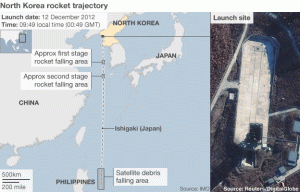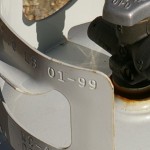From BBC.co.uk | On December 11th, 2012
 North Korea has successfully launched a long-range rocket, defying international warnings.
North Korea has successfully launched a long-range rocket, defying international warnings.
The Unha-3 rocket, launched at 09:49 local time (00:49 GMT), appears to have followed its planned trajectory, with stages falling in expected areas.
North Korea says a satellite has been placed in orbit; the US confirmed an object had been put into space.
South Korea, the US and Japan have condemned the launch as a disguised test of long-range missile technology.
A UN resolution passed in June 2009 after North Korea’s second nuclear test banned Pyongyang from ballistic missile tests.
The US called it a “highly provocative act that threatens regional security”, while UN Secretary General Ban Ki-moon said it was a “clear violation” of the UN resolution.
Japan has called for an emergency meeting of the UN Security Council. Reports suggested this could take place later on Wednesday.
The launch comes a week ahead of the South Korean presidential election and roughly a year after the death of leader Kim Jong-il, on 17 December 2011.
‘Extremely Regrettable’
The three-stage rocket was launched from a site on North Korea’s west coast.
“The launch of the second version of our Kwangmyongsong-3 [Unha-3] satellite from the Sohae Space Centre… on December 12 was successful,” state news agency KCNA said. “The satellite has entered the orbit as planned.”
The rocket had been scheduled to pass between the Korean peninsula and China, with a second stage coming down off the Philippines.
“The missile was tracked on a southerly azimuth [angle]. Initial indications are that the first stage fell into the Yellow Sea,” a North American Aerospace Defence Command (Norad) statement said.
“The second stage was assessed to fall into the Philippine Sea. Initial indications are that the missile deployed an object that appeared to achieve orbit.”
The Japanese government, which put its armed forces on alert ahead of the launch, said the rocket had passed over parts of Okinawa prefecture, south of the Japanese mainland.
“The missile that North Korea calls a satellite passed over Okinawa around 10:01. We launched no interception,” a government statement quoted by AFP news agency said.
Japan had threatened to shoot down any debris which infringed on its territory, deploying naval vessels and land-based missile interceptors.
Its top government spokesman called the launch “extremely regrettable” and something that Japan “cannot tolerate”.
South Korean President Lee Myung-bak, meanwhile, called an emergency meeting of his top advisers. His foreign minister said the government strongly condemned the launch.
The US called the launch another “example of North Korea’s pattern of irresponsible behaviour”.
A Japanese soldier runs toward a Patriot Advanced Capability-3 interceptor on southern Japanese island of Ishigaki on 12 December 2012 Japan said the rocket passed over its territory, but it did not shoot it down
In China – which is North Korea’s closest ally – Foreign Ministry spokesman Hong Lei expressed “regret” at the launch. A commentary from state-run Xinhua news agency called on all parties to remain “cool headed” and engage in “trust-building measures”.
Analysis
North Korea’s “satellite launch” has come as a surprise on two counts. The first is that it came unannounced, just two days after Pyongyang extended its launch window, citing a “technical deficiency” in the first stage of its rocket.
The second is that it seems to have been a success. Both North Korea and US analysts seems to agree that the launch was indeed successful and that the rocket placed the satellite into orbit.
That is a vast improvement on North Korea’s previous launch attempt in April, when the rocket fell apart into the sea moments after take-off.
Crucially, too, this is the first time that North Korea’s claims of success have been backed by key international observers. But the technical success of the launch is about the only thing that Pyongyang and Washington agree on.
The US and its allies allege that North Korea’s satellite launches are in fact cover for a long-range missile programme, designed to develop weapons that could strike the US.
—
This article was originally posted at http://www.bbc.co.uk/news/world-asia-20690338
Ladies and gentlemen: What if the satellite that was launched yesterday and put into orbit was actually an EMP (Electro-Magnetic Pulse) device? -Ed.







